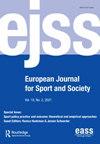Sport and social cohesion within European policy: a critical discourse analysis
IF 1
Q2 HOSPITALITY, LEISURE, SPORT & TOURISM
引用次数: 10
Abstract
Abstract Social cohesion is increasingly present and prioritised on the European political agenda. Generally defined as some combination of trust, solidarity and identity, social cohesion is considered the 'glue' that binds societies together. Due to its interactive nature and supposedly universal appeal, sport has been called upon to play a role in fostering social cohesion across the continent. Accordingly, the European Union has invested considerable policy attention and financial resources into related sports projects. Despite this growing attention, we still have little understanding of how social cohesion is conceptualised in EU sport policy or how political priorities and funding requirements influence funded projects. Therefore, this paper aims to contribute to discussions on the role of (sport) policy and funding priorities on our understanding of social cohesion as well as the implementation of sport for social cohesion projects. This paper's findings are generated through a Critical Discourse Analysis of European policy texts and over 200 Erasmus + Sport project descriptions. Based on this, I argue that the Erasmus + funding mechanism and its associated policies take a broad, politically convenient view of social cohesion and endorse a predominantly individual-centred, technical approach to fostering social cohesion. Ultimately, this ignores the systems or privileged groups that inhibit social cohesion and fails to address the root causes of and barriers to social cohesion.欧洲政策中的体育与社会凝聚力:批判性话语分析
摘要社会凝聚力日益成为欧洲政治议程上的重要内容。社会凝聚力通常被定义为信任、团结和身份的某种结合,被认为是将社会联系在一起的“粘合剂”。由于其互动性和所谓的普遍吸引力,体育被要求在促进整个大陆的社会凝聚力方面发挥作用。因此,欧洲联盟在相关体育项目上投入了大量的政策关注和财政资源。尽管关注度越来越高,但我们对欧盟体育政策中社会凝聚力的概念化,以及政治优先事项和资金要求如何影响资助项目仍知之甚少。因此,本文旨在促进讨论(体育)政策和资金优先事项对我们理解社会凝聚力的作用,以及体育促进社会凝聚力项目的实施。本文的研究结果是通过对欧洲政策文本和200多篇伊拉斯谟的批判性话语分析得出的 + 体育项目说明。基于此,我认为伊拉斯谟 + 筹资机制及其相关政策对社会凝聚力持广泛、政治上方便的观点,并赞同以个人为中心的技术方法来促进社会凝聚力。最终,这忽略了抑制社会凝聚力的制度或特权群体,未能解决社会凝聚力的根本原因和障碍。
本文章由计算机程序翻译,如有差异,请以英文原文为准。
求助全文
约1分钟内获得全文
求助全文
来源期刊

European Journal for Sport and Society
HOSPITALITY, LEISURE, SPORT & TOURISM-
CiteScore
3.30
自引率
4.20%
发文量
17
 求助内容:
求助内容: 应助结果提醒方式:
应助结果提醒方式:


